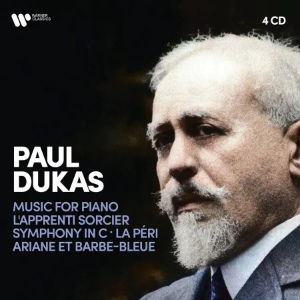
Paul Dukas (1865-1935)
Piano Works
Orchestral Works
See details of works, performers, recording dates and recording locations at the end of the review below
No texts
Warner Classics 5419 780871 [4 CDs: 295]
The core of Dukas’ achievement is here in a crisp 4-CD set, because the composer was famously self-critical. Some early works escaped his destructive impulses and can be heard elsewhere but this box brings us the Dukas essence.
The Piano Sonata is a large-scale 40-minute work that has attracted a number of interpreters over the years: Fingerhut on Chandos, Ogdon on EMI – thus available for this box – and Hamelin have all played it but François-René Duchâble’s 1978 Parisian recording is an excellent choice. The recording is clear and pingy and allows one to get to the heart of the sonata. Forget those lurid stories about Duchâble dropping his piano from a helicopter and listen instead to his adroitly sensitive infolding of the slow movement of this sonata. Dukas’ pupil Jean Hubeau is an equally wise guide to the remainder of the first disc, less the final item, L’Apprenti sorcier. He dances nimbly between the ebullient and the impressionist influences on Dukas during the Variations, Interlude et Final sur un thème de Jean-Philippe Rameau before unleashing the final variations, with their increasingly complex resolute language, and the finale with its caprice and playful elements intact. He brings out the drifting Dukas harmonies of Prélude Élégiaque. He too recorded the Piano Sonata which can be found on a Warner Apex box but democritization is no bad thing. Martha Argerich and Alexandre Rabinovitch play L’Apprenti sorcier in Berlin in 1995.
CD 2 is dominated by the grand Symphony in C major, composed just under a decade after Franck’s. This has received some splendid recordings over the years, notably from Armin Jordan, currently housed in a superb Erato ‘Icons’ box, and Yan Pascal Tortelier on Chandos, and these are only two of my own personal recommended versions. However, Jean Martinon’s recording is really in a class of its own, recorded in 1972 with the Orchestre National de l’O.R.T.F. His orchestra is a clean-limbed responsive instrument and the early 70s sonics hold up very well though they can sound hemmed in if we are being ultra-critical. However, Martinon has it all – the cantilever, the drama, the hothouse, the affecting expressivo of the central movement and the ebullient finale. Add to this the passionate Wagner-derived romance of Polyeucte and you have an ideal slice of Dukas’ orchestral music to which one can add the final item, L’Apprenti sorcier in its orchestral garb. All these Martinon performances can be found in a Martinon Erato/Warner box. There are actually two additions in CD 2, the Villanelle played adroitly by the horn player Pierre del Vescovo and Jean Hubeau, and the Sonnet sung by the youthfully feminine-sounding Philippe Jaroussky with pianist Jérôme Ducros.
CD 3 opens with Armin Jordan’s La Péri, of which one extract, the luscious, colourful and lucid Poème dansé, is in the Jordan box. What’s not there is his exceptionally fine recording of Ariane et Barbe-Bleue. There have been recordings since – Gary Bertini’s Cologne recording on Capriccio was very fine indeed – but Jordan’s has stood the test of time and is now 40 years old. I suppose it’s cast in the Pelléas mould, if we have to anatomize its stylistic origins – which is another way of saying it’s one of those Franch operas during which nothing happens. It was finished four years after Pelléas was premiered and about six years before Fauré’s equally static Penelope. However, that’s not to take account of Dukas’ fascinating scoring, his terse, pulsing outbursts which contrast with moments of almost sullen withdrawal – along with the subtle coloration and patina of his orchestration. The chorus is on fine form and the singers, led by Katherine Ciesinski, excellent – it’s essentially an all-female cast as Blue Beard himself is largely notable for his absence.
Unfortunately, the 5-page booklet, in three languages, comes without a libretto. I know that there are arguments for keeping down the price of a set such as this but these things must be mentioned. Almost half the set is given over to Ariane et Barbe-Bleue so you had better have a libretto handy or your French had better be up to it.
This caveat aside, the box offers a splendid way to get to grips with a composer’s work in outstanding recordings, finely recorded, and (libretto aside) well presented.
Jonathan Woolf
Help us financially by purchasing from


Contents & performance details
CD 1
Piano Sonata in E flat major (1899-1901)
Variations, Interlude et Final sur un thème de Jean-Philippe Rameau (c.1899-1902)
Prélude élégiaque (1909)
La Plainte, au loin, du faune…(1920)
L’Apprenti sorcier (1897), arr two pianos, Alexandre Rabinovitch
François-René Duchâble (piano: Sonata); Jean Hubeau (piano: Variations, Prélude, La Plainte): Martha Argerich and Alexandre Rabinovitch (pianos: L’Apprenti sorcier)
rec. 1978, Salle Wagram, Paris (Sonata): 1987, Salle Adyar, Paris (Variations, Prélude, La Plainte): 1995, Teldec Studios, Berlin (L’Apprenti sorcier)
CD 2
Villanelle pour cor et piano (1906)
Sonnet (1924)
Polyeucte (1891)
Symphony in C major (1895-96)
L’Apprenti sorcier (1897)
Pierre del Vescovo (horn) and Jean Hubeau (piano)
Philippe Jaroussky (counter-tenor) and Jérôme Ducros (piano)
Orchestre National de l’O.R.T.F/Jean Martinon
rec. 1971, Maison de l’O.R.T.F (Polyeucte, L’Apprenti sorcier): rec. 1972, Maison de l’O.R.T.F (Symphony): 2008, Chambre Syndicale Typographique Parisienne, Salle Akustica, Paris (Sonnet)
CD 3
La Péri (1911)
Orchestre de la Suisse Romande/Armin Jordan
rec. 1983, Radio France, Paris
Ariane et Barbe-Bleue (1899-1906) – beginning
CD 4
Ariane et Barbe-Bleue (1899-1906) – concluded
Katherine Ciesinski (soprano) – Ariane
Gabriel Bacquier (baritone) – Barbe-Bleue
Mariana Paunova (alto) – La Nourrice
Hanna Schaer (mezzo-soprano) – Sélysette
Anne-Marie Blanzat (soprano) – Ygraine
Jocelyne Chamonin (soprano) -Mélisande
Michelle Command (soprano) – Bellangère
Chris de Moore (baritone), André Meurant (tenor), Gilbert Chrétien (tenor) – Peasants
Choir of Radio France, Nouvel Orchestre Philharmonique/Armin Jordan
rec. 1984, Victoria Hall, Geneva

















